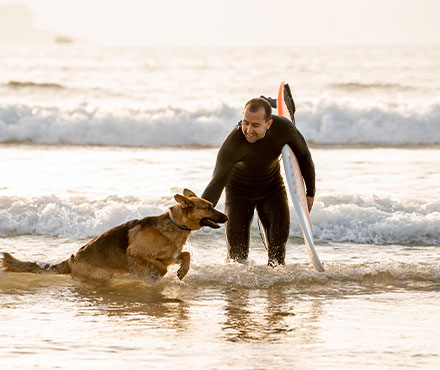Why Do Dogs And Cats Sniff Each Other?

For all the reasons we love our dogs and cats, their sniffing each other’s butts isn’t exactly one of them. Yet sniffing is a vital part of animal socialization and important behavior. Why do they sniff each other? It’s a simple question with several intriguing answers.
Below is an introduction to sniffing that explains some of the anatomical and behavioral reasons for this behavior.
Strong Sense of Smell
Dogs and cats both have an acute sense of smell, which means scent is a primary way for them to explore and understand the world around them. Cats’ sense of smell is fourteen times more powerful than humans, while a dog’s sense of smell is 100,000 times more sensitive than humans.
This means that much more of a dog’s brain is dedicated to processing odors. Both dogs and cats have a special organ in their noses called the Jacobsen’s organ, which helps them detect pheromones. For example, a kitten will use its Jacobsen organ to detect its nursing mother. Also, if you ever see a cat lift its upper lip as though it is smiling, the cat is actually letting air with smell into its Jacobsen organ and processing the scent. So, when dogs and cats sniff anything, they are picking up far more information than humans possibly could.
Lots of Stored Information
Sniffing is much more than a greeting when it comes to cats and dogs. In dogs, two pouches, known as anal sacs, release scent molecules and pheromones. These sacs offer the sniffer “a brief biography” of the animal he’s sniffing out. That biography might be something like the small talk we make about ourselves at a dinner party. The sniffer can pick up on everything from his counterpart’s sex, diet, owner, and reproductive status. Among dogs, males in public spaces are more inclined to have a sniff.
Cats also have active anal glands that make sniffing an information-rich undertaking. For cats, the very act of sniffing can say a lot about the relationship that is about to develop. A dominant cat will typically initiate sniffing, while a submissive cat will wait to be sniffed. For cats, sniffing tells whether a new cat will be a friend or not. Experts say that sniffing another animal’s butt isn’t the point. Rather, it’s where all that vital information is kept. If a cat is feeling shy, he might sit with his tail folded over his butt, to limit the amount of information he is releasing.
Should I Let My Dog Sniff?
If you are introducing your dog to a new dog, it’s a good idea to let the two dogs sniff each other to become acquainted, provided that both dogs seem comfortable.
Cats are likely to meet new cats less frequently than dogs and should be introduced more gradually.
Conclusion
Dogs have stories to tell, so letting them indulge in natural behavior is a good way to help them get along. Not every dog will like each other, but there’s a better chance of it if you let nature take its course.
Sources:
- https://vcahospitals.com/shop/articles/why-do-dogs-and-cats-sniff-butts
- https://www.hillspet.com/dog-care/behavior-appearance/why-do-dogs-sniff-each-others-butts
- https://vcahospitals.com/know-your-pet/why-cats-sniff-butts
- https://www.thesprucepets.com/why-do-dogs-sniff-butts-1118302
Previous article

Next article

Related posts
View all-

Activities To Do With A Dog That Loves Water
Some dog breeds seem to be happy to play in the water all day if you let them. For these pups, there are plenty of summer activities that will keep them entertained. Here are examples you can do with a dog that loves to splash and play in the water. Read Article -

How to Get My Cat to Use His Scratching Post
Many cats prefer scratching furniture over a post, leaving their owners frustrated with shredded sofas and clawed-up carpets. But don’t worry—getting your cat to use a scratching post instead of your couch is possible with the right approach.
Read Article -

How to Get My Cat to Stop Using My Chairs as Scratching Posts
If your cat is turning your dining chairs into their personal scratching post, you’re not alone. Many cats scratch furniture, and while it’s frustrating, it’s also completely normal. Scratching isn’t just about sharpening their claws—it’s how cats stretch, mark their territory with scent glands, and relieve stress.
Read Article



